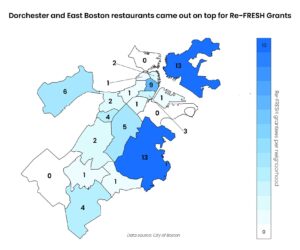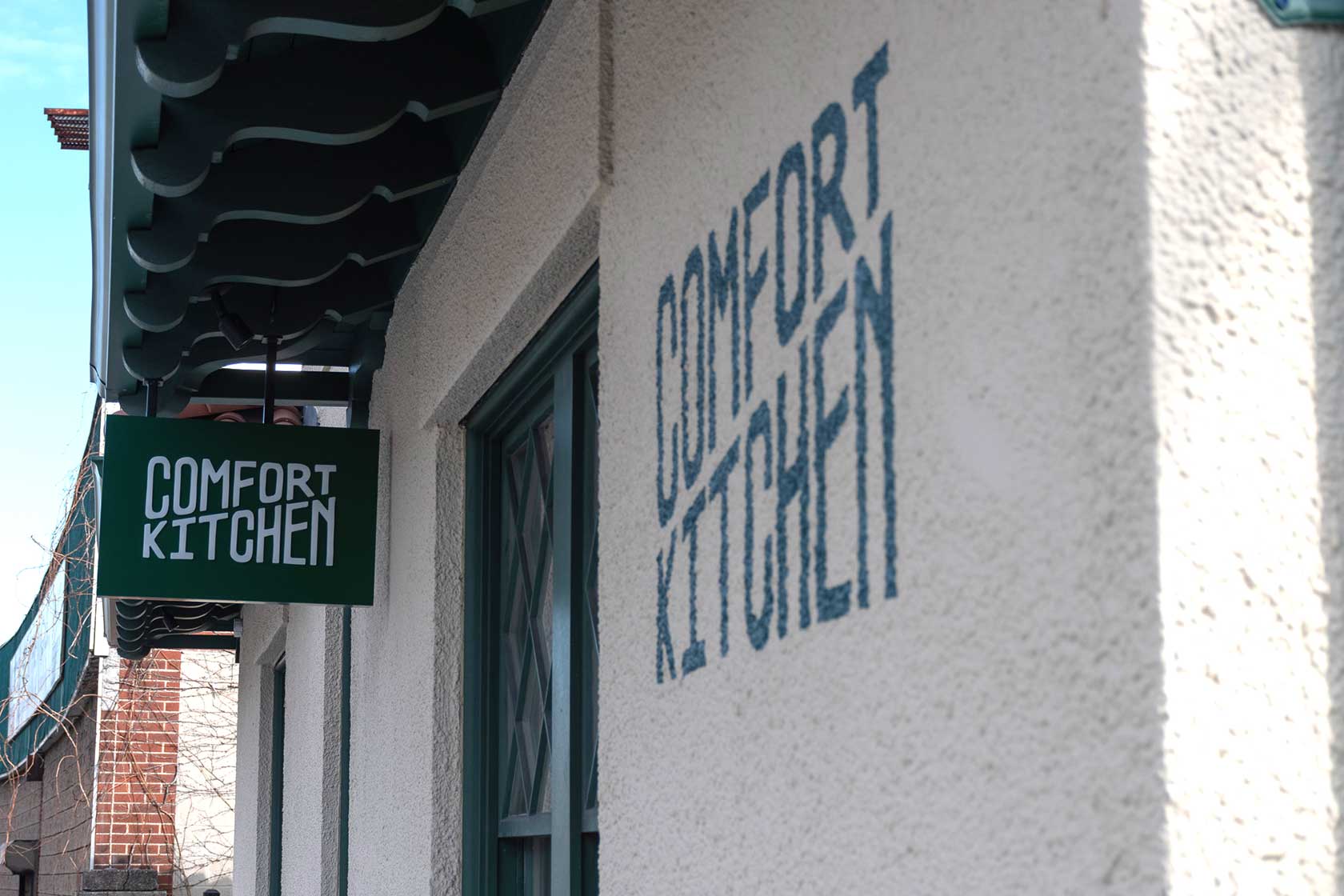New city funding for 66 local restaurants and food-processing companies is intended to bolster an industry that has faced particular challenges during the COVID-19 pandemic.
The $500,000 in funding from a federal pandemic relief package was announced earlier this month as the first of two rounds of grants as part of the city’s holistic revitalization of restaurants and foodservice businesses. — or Re-FRESH — program.
“The Re-FRESH program is about how we can revitalize these restaurants and food service businesses so they are no longer struggling and thriving,” says Aliesha Porcena, director of Boston’s Office of Small Business Development, the city team that administers the grants.
The program was first announced by Mayor Michelle Wu in November. A total of $1 million in federal pandemic relief funds will be provided in two rounds of grants. The city’s support will be used for business needs such as payroll, rent, inventory and other fixed costs.
In the first round of funding, grants ranged from $2,000 to $15,000.
Dorchester came out on top in terms of the number of grantees, with 13 of the restaurants that received the city’s grants calling the neighborhood home. East Boston had the same number, and Downtown Boston, Allston/Brighton and Roxbury rounded out the top five.
Key to the program, Porcena said, are technical assistance efforts that complement the grants. The city is partnering with PrepShift, a Boston-based company that helps food industry companies improve their operations.
The decision to focus on supporting planning is a result of experiences from the pandemic era. Porcena said at the time they would give out funding to support businesses in the food industry, only to find months later that those same businesses came back and said they needed more.
“That showed us there was no plan for the grant, no plan for the funding,” she said. “We wanted to make sure this time that we corrected course to make sure that the companies that are receiving the grant have an idea of what the best decision is for that grant money.”
This aspect is important to ensure that the funding actually helps and does not harm the small businesses that receive it, says Irene Shiang Li, CEO of PrepShift.
“Sometimes money that falls into your lap can just bring more trouble,” Li said. “If you were given a $5,000, $10,000 or $15,000 grant, there are probably 10 things you could do with it. And depending on what stage your business is at and how healthy it is, some of those could actually backfire.”

This technical support will come in the form of a diagnostic assessment, a report based on an in-depth interview that determines where a company stands in terms of development and maturity on a five-point scale from “unsustainable” to “optimizing.” Li said most companies fall somewhere in the middle.
This score will then determine the next steps, with individual support or participation in workshops on topics such asfrom food costs and menu design to taxes and accounting. Porcena said these workshops, which are largeThe virtual “gely” programs are open to all companies in the food industry, regardless of whether they have received funding or not.
Providing additional support to ensure city funding is effective is an ongoing priority for the Office of Small Businesses, Porcena said.
“They don’t just get a grant, they get a grant and a plan,” she said. “That’s what we’re trying to do with all of our work, is to make sure we create sustainability in companies and with companies to sure that they a plan for the future.”
Given the cost of operating in the food industry, none of the compensation amounts (up to $15,000) are enormous.
An early 2020 article on the food website Eater about Mei Mei, Li’s then-dumpling restaurant—which the pandemic forced its closure and conversion to a dumpling factory—said annual direct operating costs were over $32,000, not even taking into account maintenance costs, rent or salaries.
And some of those larger awards also went to a handful of companies with more than one location, so the funds could benefit both businesses, Porcena said.
However, for companies that are behind on rent and want to reduce those costs, upgrade their equipment’s software or hardware, expand their advertising or hire a professional accountant, the city’s funds could be an important step, Li said.
“In some ways it’s not a lot of money, but if you spend it wisely and align it with your priorities, it can make a huge difference,” she said.
The grants and support are intended to support an industry that has always faced particular challenges and has been particularly hard hit during the COVID-19 pandemic, Li said.
According to the National Restaurant Association, more than 110,000 restaurants were permanently or long-term closed by the end of 2020. That report, the result of a national survey, found that 87% of full-service restaurants reported a 36% decline in revenue.
Li said this was partly due to the high level of competition in the industry. On any given high street, there are likely dozens of restaurants all vying for the same customers. When the pandemic hit, businesses that had thrived without the use of technology or more formal business systems had to work double time to catch up as they had to get used to things like online ordering.
In addition, she said that while many people would like to help restaurants, they often lack the knowledge of how to do so.
“I think what we sometimes lack is the right people who know how to really help restaurants,” Li says.
Her company is trying to provide that kind of expertise — PrepShift also works with Cambridge and Lowell — and she believes it will be important to making the grants effective for Boston.
“We hope that with our experience and also with an outside perspective, we can help people be really smart about prioritizing so that they don’t spend their money on things that might be a better fit for a larger or more mature company or a company that has better control over its expenses,” Li said.
The city resumed funding at the end of July for the second round of funding. The requirements for companies were expanded and the upper limits at which small businesses can receive funding were raised.
In this new round, for which applications must be submitted by September 13, the maximum number of employees for an eligible company has been increased from 25 to 30 and the annual revenue cap has been raised from two to three million dollars.

